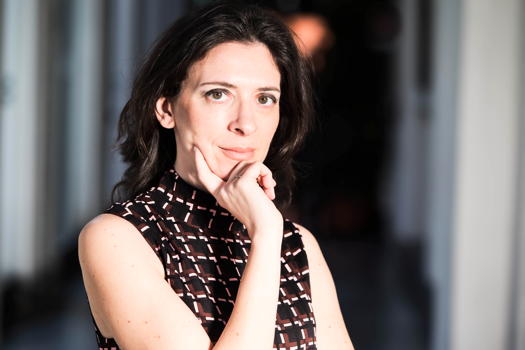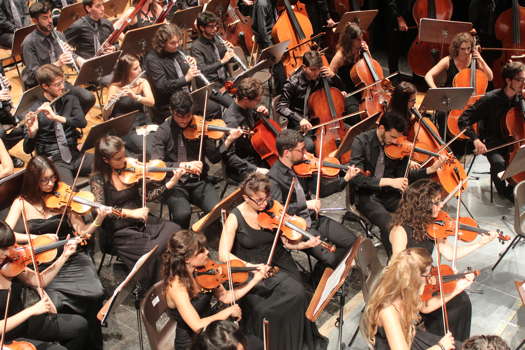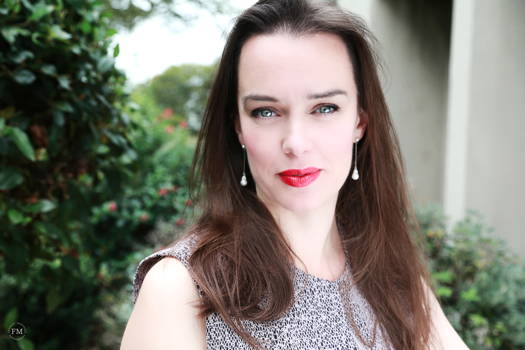- Aaron Copland
- Jeffrey Rathbun
- Hyperion Records
- Serge Collot
- Marcel Saint-Cyr
- Alicia Rytlewski
- Napoleon
- Nevio Cavina
 DISCUSSION: John Dante Prevedini leads a discussion about Music and the Visual World, including contributions from Celia Craig, Halida Dinova and Yekaterina Lebedeva.
DISCUSSION: John Dante Prevedini leads a discussion about Music and the Visual World, including contributions from Celia Craig, Halida Dinova and Yekaterina Lebedeva.
 SPONSORED: Think of Something Beautiful - Malcolm Miller pays tribute to contralto Sybil Michelow (1925-2013).
SPONSORED: Think of Something Beautiful - Malcolm Miller pays tribute to contralto Sybil Michelow (1925-2013).
All sponsored features >>
Proserpine in Spoleto
An opera by Italian composer Silvia Colasanti,
experienced by GIUSEPPE PENNISI
After some ten years of troubles, the Spoleto Festival (originally named the Festival of Two Worlds, meaning Europe and the United States) was revamped thanks to a major managerial change in 2007. I had been attending the Festival quite faithfully until the mid-1990s. Then I began to follow the Aix-en-Provence Festival that deals only with music and especially opera; consequently, it is more to my liking. The two festivals are scheduled at the same time of the year. In the last couple of years, I wasn't able to attend the Spoleto Festival for an array of reasons. Thus, this year I made a comeback, in particular to see and listen to the opera Proserpine by Silvia Colasanti, an impressive young composer who enthralled me with her work La Metamorfosi at the May Florence Music Festival five years ago, as reported in 'Rather Classical', Music & Vision, 16 March 2014.

Silvia Colasanti. Photo © 2019 Max Pucciariello
A few words on the festival, now at its sixty-second edition. It is a two week multi-disciplinary event, this year running from 28 June until 14 July and encompassing an opera, symphonic and chamber music concerts, drama, dance and visual arts. Spoleto has several venues: there are about eight performances a day. It is no longer an event where (as originally conceived) young American artists perform in Italy with top-notch directors, but is now mostly a European Festival, competing with many more other festivals than in 1958 when it started. Opera and music at large have less importance than in the past, when the festival was directed by its creator, the composer Gian Carlo Menotti. Nonetheless, over the last ten years, some of its opera productions have been seen in other Italian theatres and abroad - a clear sign of success.
Proserpine was the inaugural event on 28 June 2019. I attended the 30 June performance in the Teatro Nuovo Gian Carlo Menotti. Proserpine is a drama by Mary Shelley, written in collaboration with Percy Shelley. It has no connection at all with the opera with the same title by Camille Saint-Saëns, recently revived in Munich and reviewed in 'Famous yet Unknown', Music & Vision, 16 October 2016. Shelley's work is a 'pastoral tragedy' centered on the mythological characters of Proserpine and her mother Ceres. The plot revolves around Proserpine's abduction by Pluto, and the intervention of Jupiter, Proserpine's father. Jupiter commands Pluto to allow her to return to earth in Spring and Summer and to live with her infernal spouse in Autumn and Winter. The purpose of the myth was to explain the alternation of seasons. Mary Shelley uses the myth to develop her ideas on the ambiguity of feelings - in particular motherly and filial emotions - and on the ambivalence of human beings. She wrote the dramatic poem immediately after Frankestein. As with several women after her, she explores the myth of Proserpine to discuss the mother-daughter relationship, a true obsession for her.
The English libretto uses Mary Shelley's verses. With a few shortenings, this 'pastoral tragedy' has been adapted by René de Ceccaty and Giorgio Ferrara (who is also stage director of the production) as a two act seventy minute opera. It opens with an overture which sets the action. In between the two acts, there is no intermission but an orchestral interlude depicting Proserpine's abduction. The stage set (by Sandro Chia) is simple but effective. The costumes by Vincent Daré are quite elaborate, almost recalling those of the Greek tragedies. The lighting by Fiammetta Baldisseri, an essential part of the production, is very good. The music and words are moulded so that each shading can be listened to and appreciated. It would please an English speaking audience more than a mostly Italian one. It would be a good buy for Opera North, English National Opera or for a festival in Britain.
The score is like an elegant lace with very skilful orchestration and well-balanced vocal writing. It is not an experimental score but a good piece of music where the main themes are intertwined and can be easily played by the orchestra as well as recognized by the listeners. In the pit is the Orchestra Giovanile Italiana, with members coming, by-and-large, from the Fiesole Music School, a very fine institution, conducted in a masterly fashion by Pierre-André Valade.

Members of the Orchestra Giovanile Italiana in 2016
The singers are internationally cast. The protagonist is the young and very interesting soprano Dísella Lárusdóttir, coloratura and quite chatty in the first part, but dramatic and melancholic in the second, after her abduction by Pluto.

Dísella Lárusdóttir. Photo © 2013 Clair McAdams
Her mother, Ceres, is mezzo Sharon Carty, who made her name at the Barbican Theatre, at the Wexford Festival and at Dutch National Opera; she makes Ceres a very dramatic and modern character.

Sharon Carty in 2015
The dreamy nymph Arethusa is the Polish-Italian mezzo Katarzyna Otczyck. Proserpine and Ceres' friends are the dark dramatic soprano Anna Patalong, alto Silvia Regazzo and soprano Gaia Petrone, forming a trio which counterpoints the drama between mother and daughter. Baritone Lorenzo Grante, the only male voice in the opera, sings Ascalaphus, Pluto's terrifying messenger.
The theatre was full. Most of the audience had come from Rome, and some from abroad. They applauded warmly the singers, orchestra and creative team, and erupted in ovations when, at the curtain calls, the composer showed up.
Copyright © 7 July 2019
Giuseppe Pennisi,
Rome, Italy



